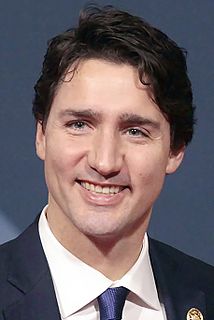
Euroscepticism means criticism of the European Union (EU) and European integration. It ranges from those who oppose some EU institutions and policies and seek reform, to those who oppose EU membership outright and see the EU as unreformable. The opposite of Euroscepticism is known as pro-Europeanism.
The Natural Law Party (NLP) is a transnational party founded in 1992 on "the principles of Transcendental Meditation", the laws of nature, and their application to all levels of government. At its peak, it was active in up to 74 countries; it continues in India and some parts of the United States. The party defines "natural law" as the organizing intelligence which governs the natural universe. The Natural Law Party advocates using the Transcendental Meditation technique and the TM-Sidhi program as tools to enliven natural law and reduce or eliminate problems in society.
The National Rally, until June 2018 known as the National Front, is a right-wing populist and nationalist political party in France. Most political commentators place the RN on the far-right, but other sources suggest that the party's position on the political spectrum has become more difficult to define clearly. Owing to the French electoral system, the party's representation in public office has been limited despite its significant share of the vote. Its major policies include opposition to French membership in NATO, European Union, the Schengen Area, and the Eurozone. As an anti-European Union party, the National Rally has opposed the European Union since its creation. The party also supports greater government intervention in the economy, protectionism, a zero tolerance approach to law and order, and significant cuts to legal immigration.

The Parti Québécois is a sovereignist and social democratic provincial political party in Quebec, Canada. The PQ advocates national sovereignty for Quebec involving independence of the province of Quebec from Canada and establishing a sovereign state. The PQ has also promoted the possibility of maintaining a loose political and economic sovereignty-association between Quebec and Canada. The party traditionally has support from the labour movement, but unlike most other social democratic parties, its ties with organized labour are informal. Members and supporters of the PQ are called "péquistes", a French word derived from the pronunciation of the party's initials.

The 2002 French presidential election consisted of a first round election on 21 April 2002, and a runoff election between the top two candidates on 5 May 2002. This presidential contest attracted a greater than usual amount of international attention because of far-right candidate Le Pen's unexpected appearance in the runoff election.
A primary election is the process by which voters, either the general public or members of a political party, can indicate their preference for a candidate in an upcoming general election or by-election, thus narrowing the field of candidates.

The Union for a Popular Movement was a centre-right political party in France that was one of the two major contemporary political parties in France along with the centre-left Socialist Party (PS). The UMP was formed in 2002 as a merger of several centre-right parties under the leadership of President Jacques Chirac. In May 2015, the party was renamed and succeeded by The Republicans.

The Radical Party of the Left is a social-liberal political party in France. A party in the Radical tradition, since 1972 the PRG was a close ally of the major party of the centre-left in France, the Socialist Party. After the 2017 presidential and legislative elections, negotiations to merge the PRG with the Radical Party began and the refounding congress to reunite the parties into the Radical Movement was held on 9 and 10 December 2017. However, a faction of ex-PRG members, including its last president Sylvia Pinel, split from the Radical Movement in February 2019 due to its expected alliance with La République En Marche in the European elections and plans to resurrect the PRG.
The Movement for France, abbreviated to MPF, is a conservative, soft Eurosceptic French political party, founded on 20 November 1994, with a marked regional stronghold in the Vendée. It is led by Philippe de Villiers, once communications minister under Jacques Chirac.

Elections to the European Parliament take place every five years by universal adult suffrage. 751 MEPs are elected to the European Parliament, which has been directly elected since 1979. No other EU institution is directly elected, with the Council of the European Union and the European Council being only indirectly legitimated through national elections. While Europarties have the right to campaign EU-wide for the European elections, campaigns still take place through national election campaigns, advertising national delegates from national parties.

France is a representative democracy. Public officials in the legislative and executive branches are either elected by the citizens or appointed by elected officials. Referendums may also be called to consult the French citizenry directly on a particular question, especially one which concerns amendment to the Constitution.

The Democratic Movement is a centrist political party in France that is characterised by a strong pro-European stance. MoDem was founded by François Bayrou to succeed the Union for French Democracy (UDF) and contest the 2007 legislative election, after his strong showing in the 2007 presidential election. Initially named the Democratic Party, the party was renamed "Democratic Movement", because there was already a small Democratic Party in France. MoDem secured an agreement with En Marche! in the 2017 legislative election after Bayrou endorsed the candidacy of Emmanuel Macron in February. In June 2017, the MoDem and its MEPs were accused of potentially fictitious employment practices within the European Parliament. Bayrou resigned on 21 June from his post as Justice Minister soon after he became embroiled in the fictitious employment scandals, and allegations of harassment against a journalist reporting on the scandal.

European elections to elect 72 French Members of the European Parliament were held on Sunday 7 June 2009.

Debout la France is a French political party founded by Nicolas Dupont-Aignan in 1999 under the name Debout la République as the "genuine Gaullist" branch of the Rally for the Republic (RPR). It was relaunched again in 2000 and 2002 and held its inaugural congress as an autonomous party in 2008. At the 2014 congress its name was changed to Debout la France.

The 2015 Canadian federal election was held on October 19, 2015, to elect members to the House of Commons of the 42nd Canadian Parliament. The writs of election for the 2015 election were issued by Governor General David Johnston on August 4. The ensuing campaign was one of the longest in Canadian history. It was also the first time since the 1979 election that a Prime Minister attempted to remain in office into a fourth consecutive Parliament and the first time since the 1980 election that someone attempted to win a fourth term of any kind as Prime Minister.

The 2014 European Parliament election in France for the election of the 8th delegation from France to the European Parliament took place on 24 May 2014 in the overseas territories of France, and on 25 May 2014 in metropolitan France. The number of seats allocated to France increased to 74, compared to 72 in the 2009 election, as a result of the 2013 reapportionment of seats in the European Parliament.

The Socialist Party is a social-democratic political party in France and was, for decades, the largest party of the French centre-left. The PS used to be one of the two major political parties in the French Fifth Republic, along with the Republicans. The Socialist Party replaced the earlier French Section of the Workers' International (SFIO) in 1969, and is currently led by First Secretary Olivier Faure. The PS is a member of the Party of European Socialists (PES), the Socialist International (SI) and the Progressive Alliance.

The Republicans is a centre-right, Gaullist, conservative political party in France.

The People's Party of Canada is a right-wing federal political party in Canada. The party was formed by Maxime Bernier, on September 14, 2018, shortly after his resignation from the Conservative party. The PPC has formed electoral district associations (EDAs) in all of Canada's 338 ridings and plan to run a full slate of candidates in the 2019 Canadian federal election, nominated between May 7 to 13, 2019.

















